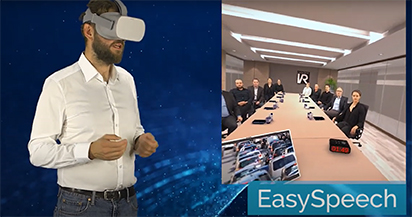 The German seminar provider and specialist publisher Dashöfer launched the virtual reality (VR) application EasySpeech for presentation skills training. Speakers can import their presentation or practice step by step rhetorical exercises such as direct speeches.
The German seminar provider and specialist publisher Dashöfer launched the virtual reality (VR) application EasySpeech for presentation skills training. Speakers can import their presentation or practice step by step rhetorical exercises such as direct speeches.
The Oculus Go was one of the first VR glasses to work “standalone”, which means without a PC. It connects to the smartphone via the in-house Wi-Fi and this in turn establishes the connection to the Oculus servers. The user can simply put on the glasses and get started.
VR grows and revolutionizes learning environments
Whoever has ever worn an Oculus Go does not need an introduction: the glasses are calibrated quickly, EasySpeech is started and the user is faced with a selection of lecture scenarios after selecting one by clicking the controller, finding himself immediately in a digital conference room with a lot of strangers focused on him.
Jumping straight into a scenario is the right strategy to feel the performance spectrum of a VR application. If you have completed the first round and are again in front of the selection menu, it becomes much clearer what you really want to train and which parameters you still want to configure.
The standard scenarios are actually quite tough: here are two main use cases: 1) the user wants to give a lecture, check the timing and smooth the verbal transitions between the slides; 2) the user basically wants to train his speaker skills. For the latter, there are very challenging tasks, such as the impromptu speech, where the software assigns you a topic and you have to speak freely about it: in the first version of EasySpeech, meetings are trained in a conference room with 10 listeners; there is the expansion to large conferences and small 1:1 scenarios, too. Furthermore, it is possible to choose whether the setup should be simple, medium, or difficult: it is "difficult" when the listeners are restless, cell phones ring, there are interrupters asking questions, there is an additional noise level, like an ambulance with a siren pasting by, or light flickering as if the power would immediately fails – in other words - incidences that usually make a speaker nervous.
In practice, it is very surprising how quickly it is possible to dive into the scenario. Maybe, at the beginning, you hesitate a little, you may not know what to tell or it is embarrassing when others watch what you are doing under the glasses, but that is forgotten after a minute or two and you start chattering.
AI gives feedback
The Dashöfer development team developed a CRM user administration, an analysis tool, and an AI speech recognition for EasySpeech and linked them via interfaces. The AI recognizes every word in the lecture and analyzes, among other things, the number of filler words (uhm, uh ..), the articulation, repetition of words, speaking speed, eye contact and the duration of the lecture. In the first evaluation appears immediately after the lecture ended by giving points between 0 and 10 which is spurring the ambition to practice more. There is no doubt that EasySpeech can train minimal invasively speaking in front of an audience. If you want to overcome your fear of speech, you will find more than enough thrill here.
Dashöfer's AI even transcribes the lecture and if it is in good quality, each lecture will become a nice piece for content marketing and makes the investment worthwhile.
By Daniela La Marca


